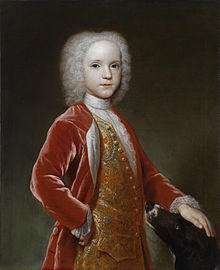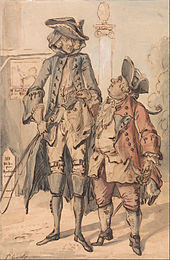George Bubb Dodington, 1st Baron Melcombe PC (1691 – 28 July 1762) was an English whig politician who sat in the House of Commons from 1715 to 1761.[1]
Christened George Bubb, he was the eldest son. of Jeremiah Bubb of Foy, Herefordshire and his wife Mary Dodington, daughter of John Dodington of Dodington, Somerset. His father died in 1696 and he was taken under the care of his uncle George Dodington. He was educated at Winchester College in 1703 and matriculated at Exeter College, Oxford on 10 July 1707 aged 16. He was admitted at Lincolns Inn in 1711 and undertook a Grand Tour from 1711 to 1713.[2]
Bubb was returned as Member of Parliament for Winchelsea at the 1715 British general election. He was sent as envoy to Spain from 1715 to 1717. He changed his surname to Dodington by Act of Parliament in 1717.[3] In 1720 he was appointed Clerk of the Pells for Ireland for life. His uncle died in 1720 and left him his estate. He was Lord Lieutenant of Somerset from 1721 to 1744. At the 1722 British general election he was returned as MP for Bridgwater. He was taken up by Walpole, who made him a Lord of the Treasury in 1724. He addressed an adulatory verse letter to Walpole in 1726, in which he praised loyalty as the supreme political virtue. He married Katherine Behan in secret, some time around 1725. He was returned again for Bridgwater at the 1727 British general election.[2] Enormously rich, he became a friend of Frederick, Prince of Wales, who took advantage of their acquaintance to obtain loans that helped clear his debts, and, on being thrown out of St James's Palace by his father, King George II, moved into a London house belonging to Dodington
Dodington was returned for Bridgwater again in 1734 when he was also returned for Melcombe Regis, and in 1741 when he was also returned for Appleby, choosing to remain at Bridgewater on both occasions. He was appointed Treasurer of the navy in 1744 and became Privy Councillor on 3 January 1745. He was returned again for Bridgwater in 1747 and was treasurer of the chamber to the Prince of Wales from 1749 to 1751.[2]
At the 1754 British general election, Dodington was returned for Melcombe Regis. He was Treasurer of the navy again from December 1755 to November 1756. He was created Baron Melcombe on 6 April 1761.[2]
Dodington had many contacts with artists and was a collector, purchasing antiquities via Cardinal Albani in Rome.[4] His house at Hammersmith, known as 'La Trappe' (an ironic reference to a Trappist monastery) was the focus of a lively political and cultural salon of supporters of Frederick, Prince of Wales whose palace at Kew was located just across the river. It was designed by the neo-Palladian architect Roger Morris who had been connected with the circle of Lord Burlington [5] and the sculpture gallery was designed by the Italian architect and firework display designer Giovanni Niccolo Servandoni[6]. Dodington is said to have been involved in a spy-ring, collecting valuable information about Jacobite activities. In 1761, following the accession of Frederick's son to the throne as George III, he was created Baron Melcombe.
Historian N.A.M. Rodger describes Dodington as an "indefatigable schemer" on behalf of his friends and interests of the time.[7] Dodington is depicted in William Hogarth's 1761 engraving Five Orders of Periwigs; his diary was published posthumously in 1784 by Henry Penruddocke Wyndham.
References
- ^ Stephen, Leslie (1888). . In Stephen, Leslie (ed.). Dictionary of National Biography. 15. London: Smith, Elder & Co. pp. 166–169.
- ^ a b c d "BUBB (afterwards DODDINGTON), George (?1691-1762), of Eastbury, Dorset". History of Parliament Online (1715-1754). Retrieved 14 February 2019.
- ^ Deed Poll Office: Private Act of Parliament 1717 (4 Geo. 1). c. 1
- ^ Lewis, Lesley (1961). Connoisseurs and Secret Agents. London: Chatto and Windus.
- ^ \Wolfe and Gandon (1739). Vitruvius Britannicus II. London. pp. plates 28 and 29.
- ^ Hornsby, Clare (1991). "Antiquarian extravagance in Hammersmith: the sculpture gallery of George Bubb Dodington". Apollo. 133 (358 pp 410-414).
- ^ Rodger, N.A.M. (1986). The Wooden World: An Anatomy of the Georgian Navy. Annapolis, Maryland: Naval Institute Press. p. 31. ISBN 0870219871.
External links
- George Bubb Dodington at the Eighteenth-Century Poetry Archive (ECPA)
- "Archival material relating to George Dodington, 1st Baron Melcombe". UK National Archives.

| Parliament of Great Britain | ||
|---|---|---|
| Preceded by Robert Bristow George Dodington | Member of Parliament for Winchelsea 1715–1722 With: Robert Bristow | Succeeded by Robert Bristow Thomas Townshend |
| Preceded by Thomas Palmer William Pitt | Member of Parliament for Bridgwater 1722–1754 With: Thomas Palmer 1722–1727, 1731–1735 Sir Halswell Tynte, Bt 1727–1731 Sir Charles Wyndham, Bt 1735–1741 Vere Poulett 1741–1747 Peregrine Poulett 1747–1753 Robert Balch 1753–1754 | Succeeded by Robert Balch The Earl of Egmont |
| Preceded by Sir James Thornhill Edward Tucker Thomas Pearse George Dodington | Member of Parliament for Weymouth and Melcombe Regis 1734–1735 With: Edward Tucker Thomas Pearse George Dodington | Succeeded by Edward Tucker Thomas Pearse George Dodington John Tucker |
| Preceded by Sir John Ramsden, Bt Walter Plumer | Member of Parliament for Appleby 1741 With: Sir John Ramsden, Bt | Succeeded by Sir John Ramsden, Bt Sir Charles Wyndham, Bt |
| Preceded by Welbore Ellis George Dodington Edward Hungate Beaghan Lord George Cavendish | Member of Parliament for Weymouth and Melcombe Regis 1754–1761 With: Welbore Ellis Lord John Cavendish John Tucker | Succeeded by John Tucker Sir Francis Dashwood, Bt John Olmius Richard Glover |
| Diplomatic posts | ||
| Preceded by Lord Bingley | British Ambassador to Spain 1715–1717 | Succeeded by John Chetwynd |
| Political offices | ||
| Preceded by Sir John Rushout, Bt | Treasurer of the Navy 1744–1749 | Succeeded by Henry Bilson-Legge |
| Preceded by George Grenville | Treasurer of the Navy 1756 | Succeeded by George Grenville |
| Honorary titles | ||
| Preceded by George Dodington | Lord Lieutenant of Somerset 1720–1744 | Succeeded by The Earl Poulett |
| Vice-Admiral of Somerset 1720–1762 | Vacant Title next held by The Earl of Egmont | |
| Peerage of Great Britain | ||
| New creation | Baron Melcombe 1761–1762 | Extinct |

